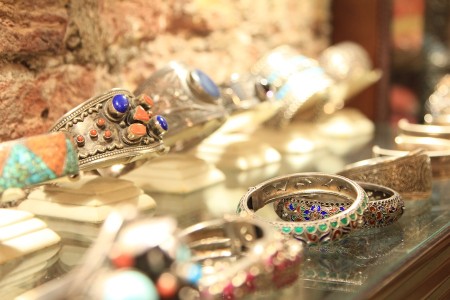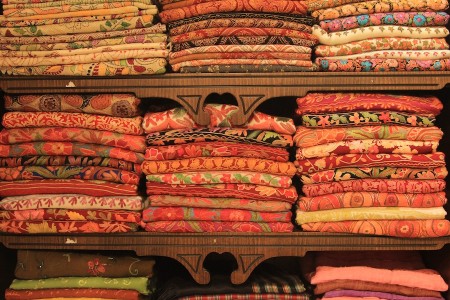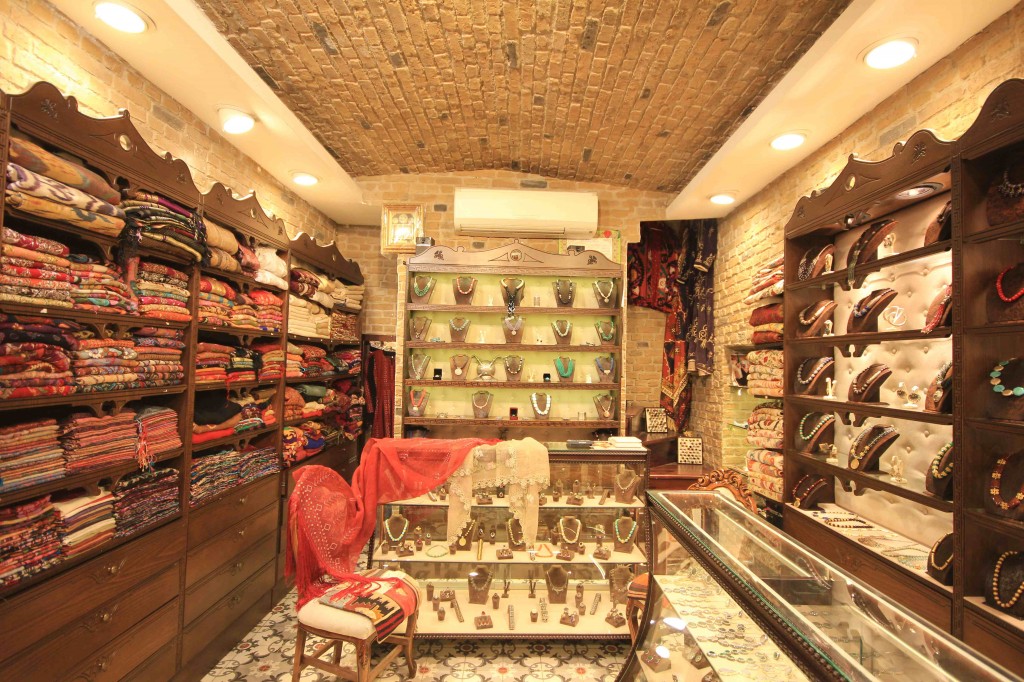
Aleppo, as it was once known, is gone, but it did not just disappear. Those that left the city’s rubble have taken what they can with them – not just heirlooms and money, but also memories and ways of living. A little bit of the city has followed each of its citizens; some who have found themselves in Jordan, a few more in Turkey and, all too many, in the grave. The little pieces they brought have been tucked away, sold for need, or buried and forgotten. Aleppo has not disappeared. It has dissipated.
Many such shards have made their way to Istanbul, in the hands of the approximately 100,000 Syrian refugees who live in the city. One of these jagged fragments can be found in Istanbul’s Spice Bazaar, to the city’s great fortune.
The place is called Maison d’Alep, and had since its establishment sold hand-made jewellery and in the now-destroyed Aleppo bazaar. The owners, Aleppo-born brothers Ghassan and Emad, then brought their shop north when leaving Syria one year ago. Upon moving to Istanbul, they rented their shop space from a Turkish spice seller. Although business has been good so far, the brothers are worried that the January closing of the Turkey-Syria border will make it difficult to work with their Aleppo craftsmen.
While there is no replacing Aleppo, Istanbul is a good place to sell things to wealthy Turks and tourists. The 350-year-old L-shaped Spice Bazaar in particular welcomes the refined taste of their store. Although the bazaar is dominated by visiting tour groups and merchants selling lokum and “Turkish Viagra,” serious business is still being conducted. When someone wants to have a discussion – about prices, food, or Aleppo – the brothers close the door to still the hawkers outside and focus on what is under their own brick dome.
“This one is amethyst, and the silver is Armenian filigree,” explains Emad to an American shopper who has come in to the store. She poses a skeptical face, but the three necklaces on the countertop belie her scowl. Most of their customers are Turkish, Emad says, but a shop in the Spice Bazaar will always attract its fair share of wandering tourists.

The crowded bazaar is on every tourist map of the city. It was built in the 1660s, as part of the New Mosque complex next door in Eminönü, on the Golden Horn,which served as the city’s port in Ottoman times. Down the hill from the imperial Topkapı Palace, the mosque and bazaar serve as well-established landmarks today. In imperial times however, the bazaar was an entrepôt for traders too busy to make their way to the larger mosques or the grand bazaar further up the city’s steep hills, which at that time were strewn with wooden houses and cobblestone streets.
When Emad talks about his jewellery’s heritage to the customers, he also expounds on Istanbul’s history. “This city and its bazaar have hosted people from Egypt, Central Asia, Afghanistan …and now, Syria.” Emad and Ghassan’s pieces are sourced through Aleppo’s craftsmen, but the Istanbul audience requires both more widespread inspirations and a careful understanding of how Syrians have affected Istanbul and vice-versa.
The Aleppo bazaar that gave the brothers their start was, after all, founded by a Turkic atabeg Nur ad-Din Zengi. It was reorganised and restructured by Yavuz Selim and his son Suleyman the Magnificent after the former’s conquest of Syria in 1516. This was over one hundred years before Istanbul’s Spice Bazaar – the current home of Maison d’Alep – was founded. The Turkish capital’s bazaar is located across a plaza from the Ottoman port, the terminus of a 2,500 km trade route between Istanbul and Basra. Aleppo, its bazaar and its traders, lay precisely in the middle of this most vital of imperial roads.
But imperial days are long gone today. To be a Syrian in Istanbul means something different than it did when the Aleppo road was the lifeline of the Ottoman sultan. The right to work, to own a business, and other benefits conferred on Turkish citizens, are not granted to Syrians. There are various legal loopholes that these Syrians must navigate in order to keep their shop shipshape and to produce their jewellery.

The brothers believe that, as Syrian businessmen, they have a responsibility towards their countrymen. It is not easy, but they manage to maintain a workshop outside of Aleppo, and their Istanbul shop is staffed by Syrian migrants. This kind of work involves knowing and making use of a wide network to get the valuable jewellery through to Istanbul from Aleppo, and creating a safe place for youth or newcomers to build their own careers. Many of the 100,000 Syrians in the city were engineers, pharmacists, and other well-educated and well-connected individuals back home, and are now looking to make ends meet if not emigrate entirely. Maison d’Alep is located in perhaps the most international part of the city, and in a market where shrewdness reigns supreme. This allows the brothers to help enterprising Syrians while shielding them from some of the more wolfish types.
Emad and Ghassan, like the other Syrians in the shop, see their time in Istanbul as temporary and are looking forward to the day when they can return home. “I am just waiting for things to be peaceful, and then we can go back to Aleppo and repair the market,” Emad explains, earnestly if a bit optimistically. They have a good shop doing good business, but the tea comes from the Black Sea and the muezzins have Turkish accents. The brothers might bring their Aleppo to Istanbul, but the city will never be the home they hope to return to. Each sunset, however, brings them farther away from Aleppo.
Photographs by Vedat Bonfil


